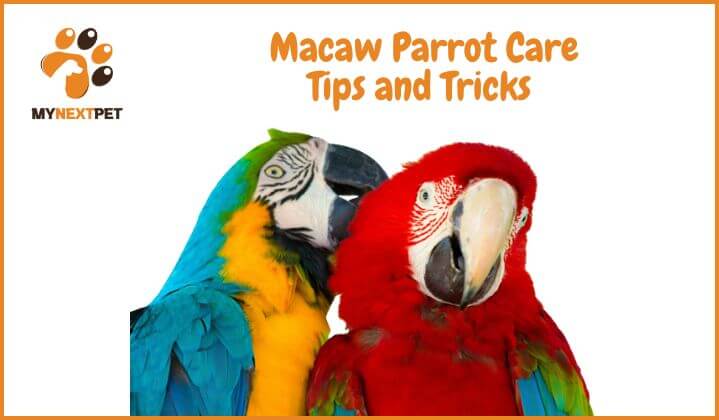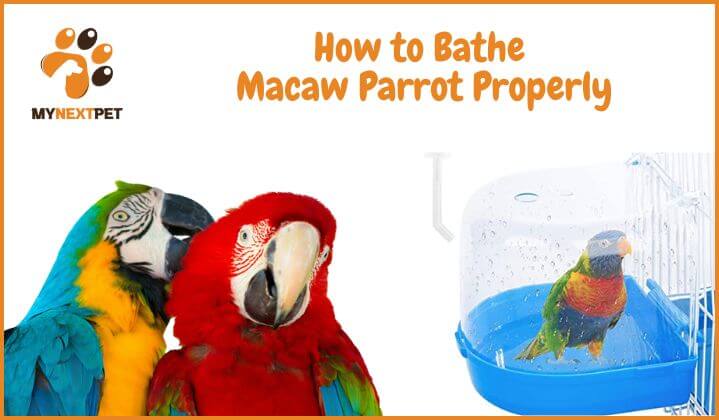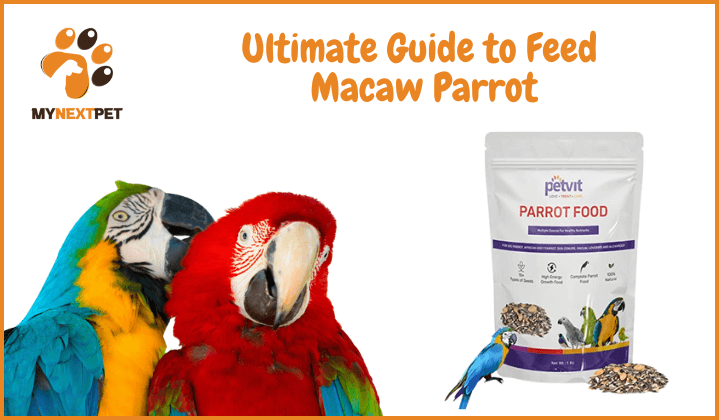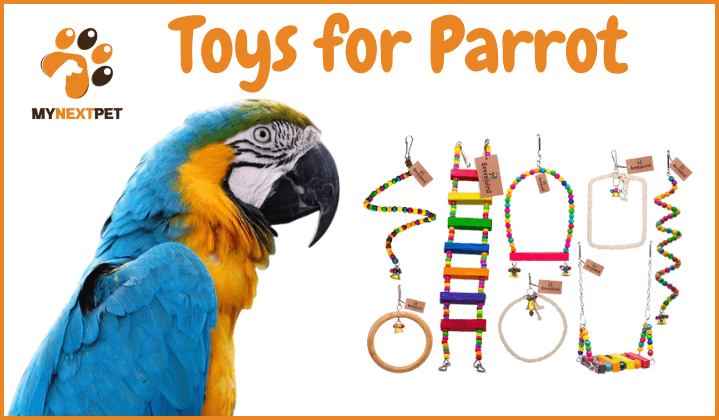Macaw parrots are known for their striking beauty, intelligence, and ability to form strong bonds with their owners. However, caring for these magnificent birds requires knowledge, dedication, and patience. As a responsible macaw owner, providing proper care and maintenance is important to ensure your feathered friend stays healthy and happy.
This article will provide a guide for macaw parrot care, including information on their diet, housing, toys requirements, caring tips and more. Whether you are a new macaw owner or have been caring for these birds for years, this guide will help you provide the best care for your beloved pet.

Macaw Parrots Care Tips
Caring for a macaw parrot requires attention, patience, and knowledge.
The owner has to take good and proper care of his pet for a long healthy life. For that, you have to follow the specific guidelines shown here.
Give Them A Lot Of Attention
Macaws are highly social birds that thrive on attention and interaction from their owners. Giving your macaw lots of attention is crucial for its mental and emotional well-being and can also help strengthen the bond between you and your bird.
Here are some tips for giving your macaw plenty of attention:
- Spend time with your macaw daily : Macaws need daily interaction and stimulation from their owners.
- Provide lots of physical contact : Macaws love physical contacts, such as petting, cuddling, and snuggling.
- Teach your macaw new tricks and behaviour : Macaws love to learn new things and show off their skills. Spend time training your bird using positive reinforcement techniques.
- Talk to your macaw : Macaws are excellent talkers who love communicating with their owners.
So, do you like to spend your time with your macaw? please let us know your caring tips in the comment.
In case you are a new bird lover, you first have to check how much costly macaw parrot in India and then you have to calculate whole expense to maintain or care your bird.
Bath Your Macaw

Regular bathing helps to keep your bird’s feathers clean, removes dirt and debris, and promotes healthy feather growth.
Provide a suitable bath container: Macaws can be bathed in various ways, such as using a shallow dish or a spray bottle.
Add a drop of mild soap: You can add a drop of mild soap, such as baby shampoo or bird-specific shampoo, to the water to help remove dirt and debris.
Allow your macaw to dry naturally: After the bath, let it air dry naturally or gently towel dry them
if you still have any confusion about bathe, you can jump to detailed information of macaw parrot bathing tips.
Clip Their Feathers and Claws
Clipping the feathers and nails of your macaw parrot is an important part of maintaining their health and ensuring their safety.
Macaws must be able to fly to stay healthy and happy, so it’s important to clip their flight feathers only if necessary for safety reasons or to prevent destructive behaviour.
Macaw’s nails should be clipped when they become too long, as long nails can cause discomfort, pain, and even injury to your bird.
Macaw Parrot Diet
Macaw parrots require a diverse and nutritious diet to maintain health and vitality. In the wild, they feed on various fruits, nuts, seeds, and insects; their captivity diet should reflect this.

A good quality commercial parrot mix can form the basis of a macaw’s diet, but it should be supplemented with fresh fruits and vegetables. Some fruits that macaws enjoy include apples, grapes, berries, and melons, while leafy greens, carrots, and sweet potatoes are good vegetable choices.
In addition to these foods, macaws also require a source of protein. This can be provided through cooked chicken, eggs, or beans. Nuts like almonds and walnuts can also be treated in moderation.
A high-fat diet can lead to obesity and other health problems, so it is important to monitor the number of treats and adjust the diet accordingly.
For more details about what and how to feed your macaw parrot, visit our blog, The Ultimate Guide to Feed Macaw Parrot.
Macaw Parrot Training
Macaw parrot training is important to ensure your bird’s health and happiness. Training can help to prevent behaviour problems, promote mental and physical stimulation, and strengthen the bond between you and your bird.
Start with basic training, such as teaching your macaw to step up onto your hand or perch, before moving on to more advanced training.
Basic obedience training involves teaching your macaw to respond to basic commands, such as “step up” and “stay.”
Trick training involves teaching your macaw to perform fun and entertaining tricks like waving or playing dead.
Target training involves using a target stick or object to guide your macaw to perform specific behaviours or move to different locations.
Flight training can involve teaching your macaw to fly to you on command or through hoops or other obstacles.
Socialization training involves exposing your macaw to different people, animals, and environments to help them feel comfortable and confident in new situations.
Remember to use positive reinforcement and to keep training sessions short and frequent. You can teach your macaw new behaviours and strengthen your bond with your feathered friend with patience and consistency.
Choose Right Cage for Macaw Parrot
A macaw parrot cage should be spacious, safe, and comfortable for your feathered friend.
Macaws are large birds, so their cage should be at least 3-4 feet wide, 3-4 feet deep, and 4-6 feet tall. The cage should allow your bird to stretch their wings and move around comfortably.
The spacing between the bars should be narrow enough to prevent your macaw from getting its head, beak, or feet stuck but wide enough to allow for good airflow.
The cage should have sturdy, non-toxic materials like stainless steel or powder-coated metal. Avoid cages made of wood, as macaws can chew through wood and ingest harmful splinters.
Provide a variety of perches in different sizes and textures, such as natural wood perches, to help keep your macaw’s feet healthy and strong.
There are many types of macaw parrot and you have to choose home wisely for your parrot by checking their size, quality.
Toys for Macaw Parrot
Toys are an important part of a macaw’s life, providing mental stimulation, entertainment, and exercise. When choosing toys for your macaw, it’s important to consider factors such as variety, size, durability, enrichment, and rotation.
Provide a variety of toys in different colours, shapes, and materials that are large enough for your macaw to play with but not small enough to be ingested. Choose toys made of sturdy, non-toxic materials that can withstand your macaw’s strong beak and claws.
Consider toys that provide enrichment, such as puzzles and foraging, and rotate your macaw’s toys regularly to keep them engaged and stimulated.
For further details about the toys, check our article on Macaw Parrot Toys.
Conclusion
In conclusion, keeping a macaw parrot healthy and happy requires dedication, patience, and attention. Always prioritize your macaw’s physical and mental well-being and seek professional help if you have concerns about their health or behaviour. Following the tips and advice in this guide, you can develop a strong bond with your macaw parrot and enjoy many years of companionship and joy together.
